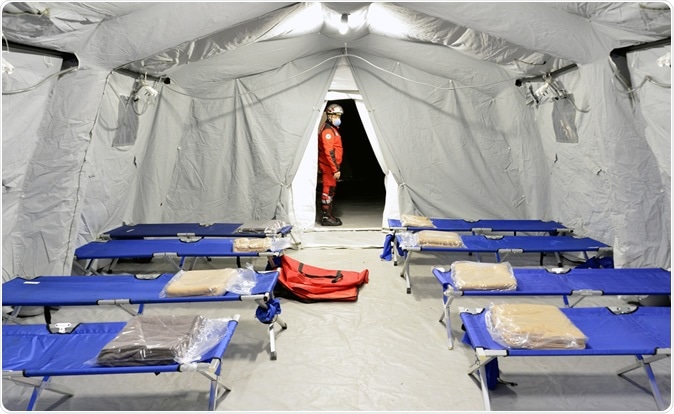After an outbreak of COVID-19 was reported in Wuhan (China) in December 2019, this disease caused by novel coronavirus SARS-CoV-2 spread rapidly to multiple countries. World Health Organization (WHO) officially declared COVID-19 a pandemic in March 2020, while experts worldwide are joining efforts to tackle this contagion.
To date, Italy is among countries that experienced one of the hardest blows, with 135,586 documented cases and 17,127 deaths (as of April 7, 2020). Over half of all confirmed cases have been found in Northern Italy, more specifically in the Lombardy region. Hence, it is not surprising Italy had to pioneer a myriad of practices and infection control measures, with eyes of the world pointed towards them.

12/03/2020 Paina, Monza Brianza, Lombardy, Italy. - Coronavirus COVID-19 pandemic. People with facial masks and gloves queuing for quota entrance in the supermarket. Image Credit: Cristiano Barni / Shutterstock
Local response, global relevance
Consequently, are there lessons that other countries can learn from Italy and implement within their borders? This is a pertinent question that Dr. Stefania Boccia and Dr. Walter Ricciardi from the University Department of Health Sciences and Public Health of the Università Cattolica del Sacro Cuore in Rome, together with Dr. John P.A. Ioannidis from Stanford School of Medicine and Meta-Research Innovation Center at Stanford (METRICS) in California, tried to tackle in their recent viewpoint.
Dr. Ioannidis, famous for his highly cited and debated publication "Why most published research findings are false" where he stated that a majority of modern biomedical operates in areas with low probability for true findings, recently warned about the potential harms of exaggerated information and subsequent non-evidence-based measures during COVID-10 pandemic.
From a global vantage point, he turned his eye to Italy, where together with Dr. Boccia and Dr. Ricciardi, they aimed to dissect contributing factors in the current medical and public health crisis. These experts have described four distinct determinants: demographics/concomitant diseases, case burden, health care system capacity, and stochastic factors.
From an aging population to systemic health care shortcomings
"COVID-19 has a strong age dependence for the severity of the infection and the risk of death", the authors remind us in this paper. And Italy is known to have the most elderly population in the whole of Europe, surpassed globally only by Japan.
Moreover, most of the affected individuals have a history of smoking, ischemic heart diseases, or chronic obstructive pulmonary disease (COPD). This undoubtedly contributed to such a high case-fatality ratio described in Italy.
"Italian life is famous for its socialization and frequent congregations and clustering," Boccia and colleagues accentuate in the publication. "It is possible also that in early stages, there was not much adoption of standard hygienic measures, and instructions to stay at home proved difficult to accept, with many complaints registered with the police."
Furthermore, possible strategic mistakes are also highlighted in the publication. Italy has a modest number of ICU beds per 100,000 population in comparison to other Western countries, and their hospitals tend to run close to full capacity during the winter season.

LOMBARDIA, ITALY - FEBRUARY 26, 2020: Empty hospital field tent for patients with coronavirus. Image Credit: Faboi / Shutterstock
At the start of this epidemic, hospitals were filled with patients with relatively modest symptoms, subsequently limiting the reserves for more severe cases that presented later. That resulted in hospital overcrowding, which may, according to the authors, explain high infection rates of medical personnel.
Lessons for the world: apply with caution!
"In the absence of prevalence and incidence data," the authors warn, "it is difficult to predict the effects of specific major public health decisions, such as lockdowns, on the course of the COVID-19 pandemic".
Their reasoning is that lockdowns may actually result in people spending more time with elderly and susceptible individuals, and eventually just prepare the terrain for a new epidemic wave that will hit immediately after removing the measures.
Instead, the authors urge the need for appraising the effects of the policies that are being adopted on the expected wave of severely ill patients that necessitate hospitalization, as countries with aggressive early contact tracing (coupled with large-scale laboratory testing) seem to provide examples of successful disease containment.
"A major question that should be answered is the causal contribution of SARS-CoV-2 infection to related deaths. It is difficult to differentiate between deaths with SARS-CoV-2 infection and deaths caused by SARS-CoV-2 infection because the vast majority of patients who have died had one or more other major pathologies (98.8% with at least one comorbidity and 48.6% have three or more diseases) that contributed to their death", the authors conclude.
Due to the finite number of conducted tests, the real number of infected people in Italy and elsewhere is still elusive, but likely higher than the official count. Therefore, it is clear that we need more research to better understand the relative burden of this disease in order to prioritize resources in currently strained health care systems around the world.
Sources:
- Ioannidis, J.P.A. (2020) Coronavirus disease 2019: the harms of exaggerated information and non-evidence-based measures. European Journal of Clinical Investigation. doi.org/10.1111/eci.13223
- Ioannidis, J.P.A. (2005) Why Most Published Research Findings Are False. PLOS Medicine. doi.org/10.1371/journal.pmed.0020124
Journal reference: